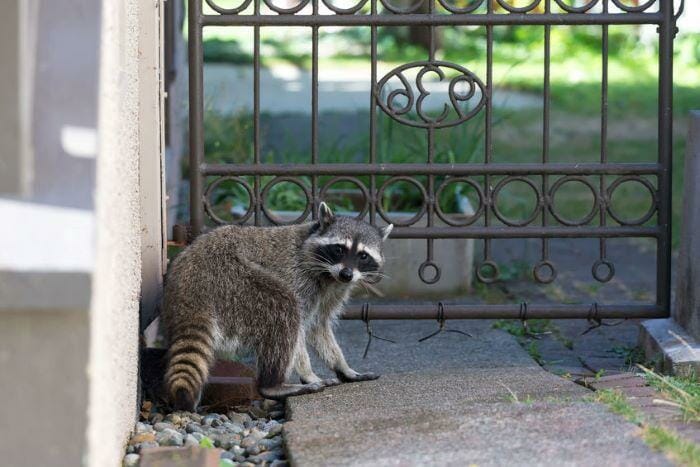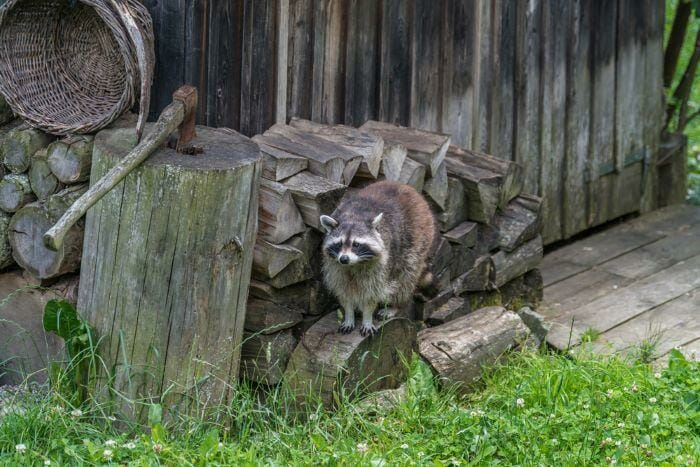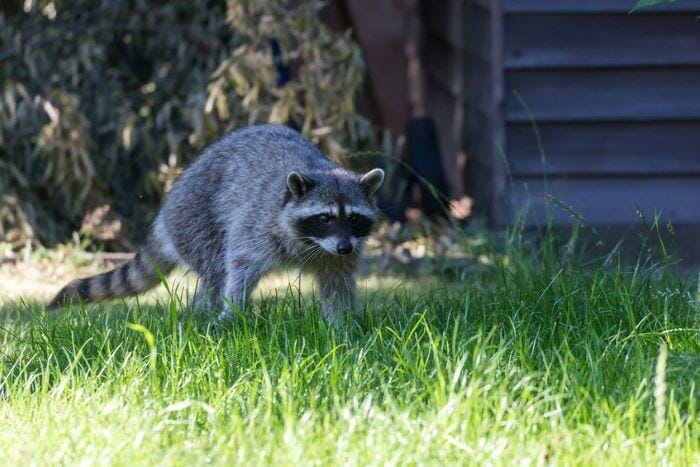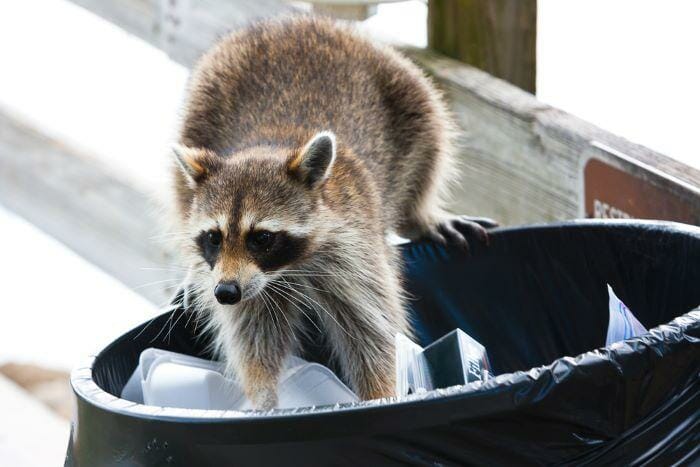How To Get Rid Of Raccoons For Good
Raccoons are smart, quirky animals that may be fun to observe from afar, but they're not creatures you want to share space with.
Raccoons dig through your trash, destroy your lawn and garden, damage your home's building materials, consume bird seed and pet food, and even transmit diseases that can be dangerous for you and your domestic pets.
With all that in mind, it's easy to see why people dealing with a raccoon problem are so desperate to learn how to get rid of raccoons!
Fortunately, you don't have to live with destructive raccoons forever.
Here at Smith's Pest Management, we specialize in providing raccoon control services to residential and commercial property owners in the San Francisco Bay Area.
In this post, we're sharing our top tip on how to get rid of raccoons once and for all.
Let's dive in.

How to Tell You've Got a Raccoon Problem
Raccoons are nocturnal, meaning they're only active at night. As a result, their presence can be difficult to detect.
The best way to tell that you have a raccoon problem is to pay attention to the clues they leave behind.
Here are a few things we recommend keeping an eye out for:
- Evidence of raccoons feeding. Raccoons are messy, ravenous eaters, and they leave a trail behind after mealtime. Common signs of raccoon feeding include knocked over trash cans, damage to your lawn or garden, empty, spilled, or moved pet food bowl, disturbed compost piles, and empty or broken bird feeders, among others.
- Tracks.The tracks of raccoons and possums look similar. Raccoons walk flat-footed, like humans do, and have claws on all their toes. The differentiating factor is that raccoon tracks move in a diagonal track pattern like deer do. Their tracks have a longer heel on the rear foot and tend to be 2-3" wide on the front feet, and 3-4" long on the rear feet.
- Droppings. Racoon droppings are cylindrical with broken or rounded ends. They tend to be dark in color, although the color varies depending on the animal's diet. The scat typically contains berry seeds and may contain signs of trash.
- Strange sounds. You may notice strange sounds around your property at night. Raccoons make noises that include mewing, whistling, and growling.
Regardless of what raccoon signs you notice, dealing with the issue promptly is critical. Raccoons can be very damaging, and waiting too long to address the problem will only make the infestation worse.
How to Get Rid of Raccoons Humanely & Naturally

When it comes to raccoon removal, we always advocate humane removal over lethal methods. If you have a raccoon problem, here are a few steps you can use to manage the raccoon population on your property:
In the attic
If you have a raccoon in the attic, it's likely a female with babies. Females looking for places to nest will rip off facia boarding, vents, and more to find a secure space.
To get rid of a raccoon in the attic, follow these steps:
- Set live raccoon traps to catch and remove all present raccoons. If you're going to do this, contact your local Fish and Wildlife Department, first. They'll be able to supply you with traps and help you relocate the raccoons safely.
- Seal all gaps and openings into your attic, including vents and seals. Use a galvanized hardwire wire mesh to seal these spaces.
- Remove all sources of food, water, and bedding material raccoons may be using.
Under the house or deck
Again, a raccoon living under the house or deck is usually a mother with babies. Female raccoons generally have their babies between January and June, so care should be taken to remove the raccoons without orphaning the babies.
Here are a few tips:
- Use live traps to catch and remove the mother raccoon and her babies.
- Once the raccoons are gone, clean out the nest spaceunder the home or deck. Remove all bedding material.
- When the space is clean,seal all access points.
- Deter raccoons from coming back with "humane harassment." Raccoons love spaces under homes and decks because they're dark, quiet, and safe. Using floodlights to illuminate the space and placing store-bought scent-based deterrents (or homemade options, like vinegar, dirty cat litter, or ammonia) decreases the appeal of these environments, and makes it less likely that raccoons will return.
In your yard or garden

When raccoons take up residence in your lawn or garden, they're typically looking for food. Raccoons scavenging for grubs, for example, will rip up grass, flowers, and landscaping to expose their favorite food sources. This can quickly cause thousands of dollars of damage to your flowers, shrubs, and grass.
To get rid of them, we recommend the following:
- Invest in a professional grub treatment. If you're based in the San Francisco Bay Area, Smith's Pest Management will treat your lawn and garden to get rid of food sources for the raccoon, encouraging raccoons to go elsewhere (and stop tearing up your grass). For best results, we recommend enrolling in an annual lawn grub treatment program, which keeps grubs from coming back each summer and keeps your property raccoon-free. Contact us to learn about this service.
- Use home remedies like ammonia, vinegar, ground-up garlic, powdered cayenne pepper, blood meal, or dirty cat litter. Sprinkle the natural deterrent for raccoons in highly trafficked areas to make the space less appealing for raccoons.
- Use motion-activated light or sound deterrents. These deterrents sense movement and emit loud noises or flashes of bright light, keeping raccoons away from your lawn and garden.
On the roof
Raccoons are excellent climbers, and, while it can be alarming to find them on your roof, it's a common experience for many homeowners.
When raccoons spend time on your roof, they can damage your shingles or roofing material, enter chimneys and vents (causing dangerous fire hazards), and more.
Here are a few smart ways to get rid of them:
- Trim the trees, vines, and landscaping around your home to decrease "bridges" onto your roof.
- Eliminate food sources that raccoons may be coming back to, including trash, compost, pet food, and birdseed.
- Place metal sheeting around the edge of your roof, as well as the bases of the trees on your property. This will deter raccoons without hurting other animals, like your outdoor cats.
- Install a strip of electric fencing on top of any fences that are close to your home or roof.
In your walls
If you have a raccoon in the wall, the situation can become stressful very quickly. Raccoons in the wall make noise at all hours of the night and can damage your insulation, wiring, and more.
Here are some tips to get rid of a raccoon in the wall:
- Hire a professional pest management company like Smith's. Getting rid of raccoons in the wall is a big job, and can be dangerous for both you and the raccoons if you attempt to DIY it.
- Once the professional pest management company has removed the raccoons from your wall, you can work to identify the access points and seal them, preventing future entry.
At the bird feeder
Figuring out how to keep raccoons away from bird feeders can feel like an uphill task. Their size, excellent climbing ability, and maneuverable hands allow them to access most birdfeeders. Fortunately, it is possible to put an end to raccoons at your feeders.
Here's what we recommend:
- Hang your feeders as high as possible. The Humane Society recommends hanging bird feeders from stands ½" or less in diameter since raccoons cannot climb such thin poles.
- Hang feeders from wires suspended between two trees. Make sure the feeders are far enough away from each tree that raccoons can't leap onto the feeder.
- Add store-boughtraccoon guards to pole-mounted feeders.
- Purchaseraccoon-resistant bird feeders.
In the chimney
A raccoon in the chimney can be a serious fire risk, as bedding and nesting materials are often highly flammable. So, what will keep raccoons away?
To get rid of raccoons in your chimney, follow these tips:
- Hire a professional to remove the raccoons from the chimney. A professional pest management company like Smith's will be able to remove all the raccoons without killing them or damaging your chimney.
- Once the raccoons are gone,clean the space they left behind. Remove any nesting material or other objects left in the chimney by the raccoon.
In your chicken coop
Raccoons are voracious chicken predators and will do anything they can to access a vulnerable chicken coop.
To keep raccoons out of your coop, follow these tips:
- Use hardware cloth to cover the windows of the coop. This cloth is sturdy enough to resist raccoon attacks.
- Bury the hardware cloth 2-4 feet deep around the perimeter of the coop to deter the raccoons from digging into the coop. Consider running the cloth over the chimney, as well, if the coop can be accessed by climbing.
- Install complex latches and locks on the chicken coop doors, which raccoons will not be able to open.
In a tree
A single raccoon in a tree may not be a large issue, but a nest of raccoons will be. Remove raccoons from a tree with these tips:
- Place live trapsto cage and remove the raccoons.
- Install sheet metal or raccoon guards to the trunks of your trees to prevent climbing.
- Clean up fruit or nutsdropped by the tree to remove food sources for raccoons.
General Tips

Here are some tips to keep raccoons off your property all year long:
- Secure trash cans. Trash is an ideal source of food for raccoons. Make sure your trash is sealed. If you keep your trash can outside, make sure it's in a heavy can with a secure lid that clips in place. Even better, keep your trash cans in a garage or closed outdoor shed, whenever possible.
- Remove pet and bird food. Any pet food or bird food outdoors should be brought in each night.
- Use fences to protect high-interest areas. Raccoons are creative, intelligent creatures, and they'll look for food in compost piles, gardens, fish ponds, and more. To keep raccoons out of these areas, install electric fences around the perimeter of them. We recommend constructing a fence with two wires – one 6 inches above the ground and the other 12 inches above the ground. This will prevent raccoon damage without harming the animals.
- Never feed raccoons. Raccoons can look cute, and they can be convincing beggars, but you should never place food out for raccoons. Even feeding a single raccoon will just attract more raccoons down the road.
How do Pest Management Experts Get Rid of Raccoons?
Sometimes, getting rid of raccoons is a job only a wildlife control professional can do. Here's how our team can help:
- Initial Assessment. First, we'll begin by assessing your problem areas. Our experienced pest control technicians will inspect your property to determine how raccoons are getting in, and what damage they're causing. We'll pinpoint their entry spaces and make a plan to resolve them.
- Trapping. While we're serious about getting rid of your raccoon problem, we always take the humane approach. To remove raccoons without harming or killing them, we'll set safe, live traps to catch the raccoons. We monitor and check these traps daily and will relocate the raccoons once we've captured them.
- Exclusion Methods. Finally, we'll prevent future raccoon infestations by installing exclusionary barriers to keep raccoons from coming back. We use commercial-grade exclusion methods that hold up to the test of time and won't negatively impact your property.
Are Raccoons Taking Over Your San Francisco Bay Area Property? We're Here to Help!
Sick of dealing with raccoons on your property? Our team is here to help. Offering comprehensive raccoon control services, Smith's Pest Management uses various eco-conscious techniques to get rid of raccoons and help you reclaim your outdoor space.
We serve residential and commercial properties in Northern California, from Marin to Monterey.
Contact us today to get a free quote!
How To Get Rid Of Raccoons For Good
Source: https://smithspestmanagement.com/blog/post/how-to-get-rid-of-raccoons/
Posted by: mathisgicence.blogspot.com

0 Response to "How To Get Rid Of Raccoons For Good"
Post a Comment